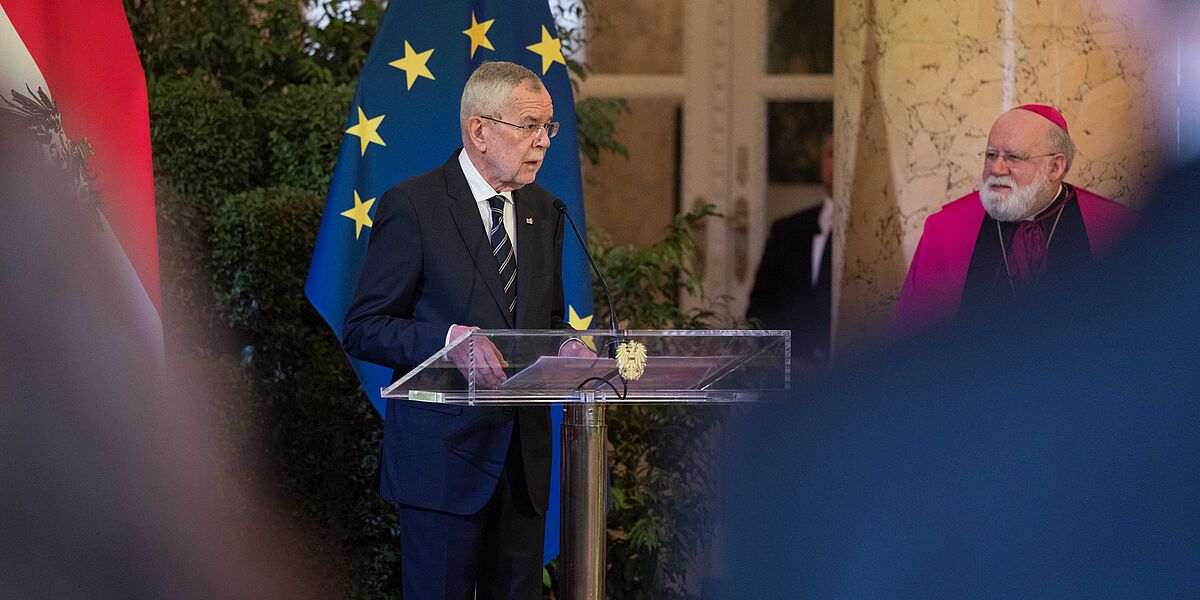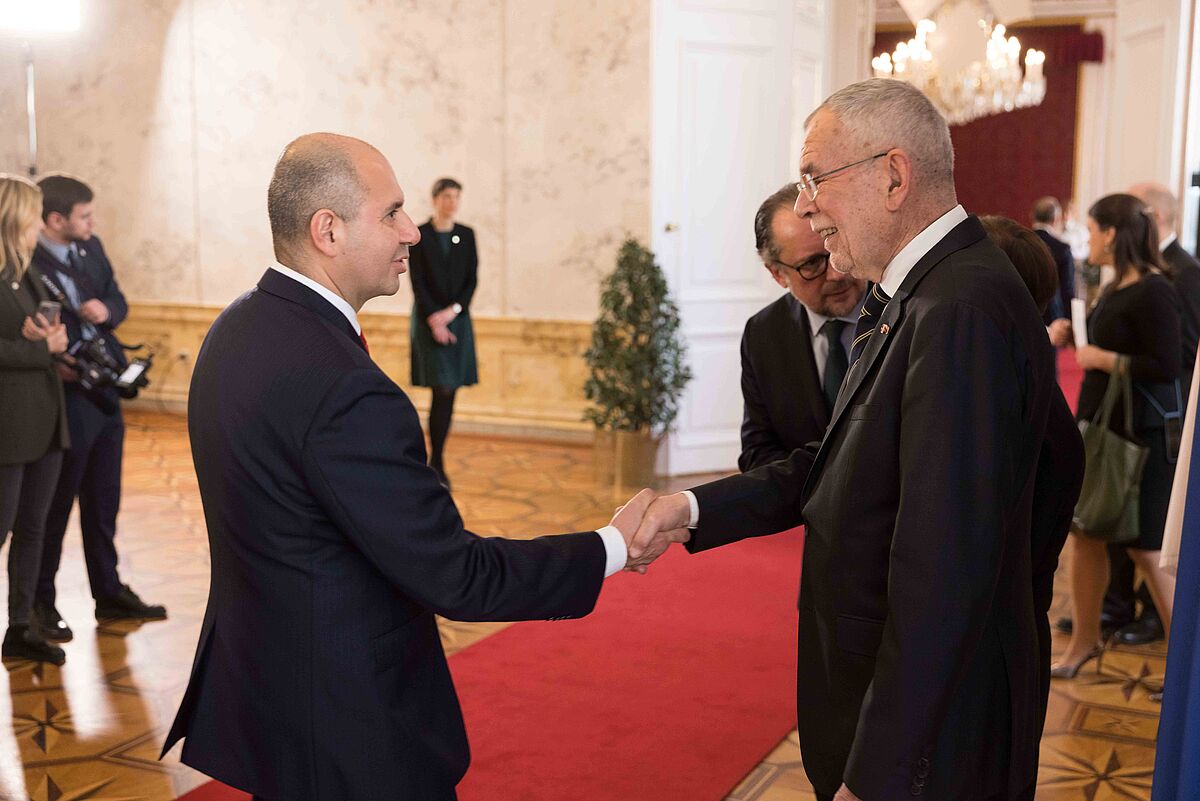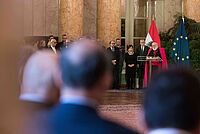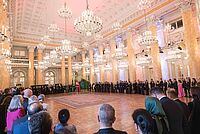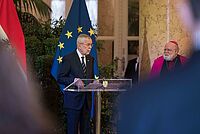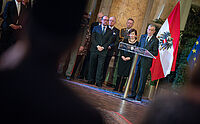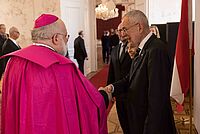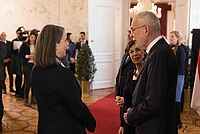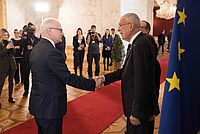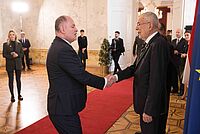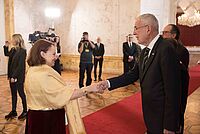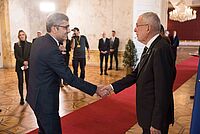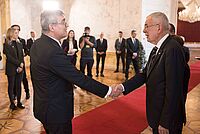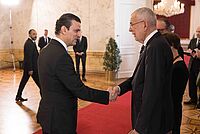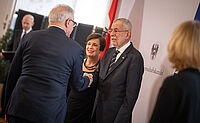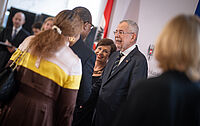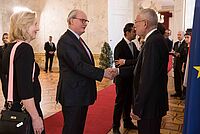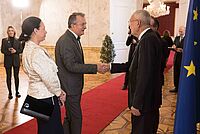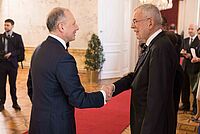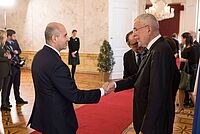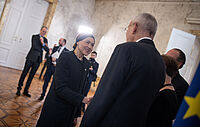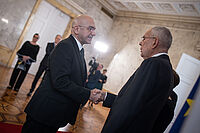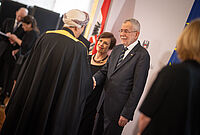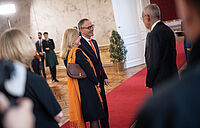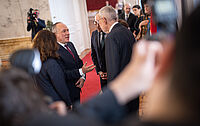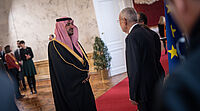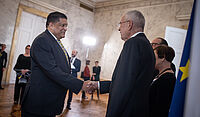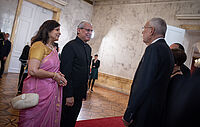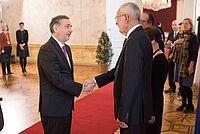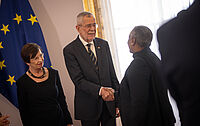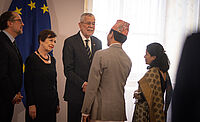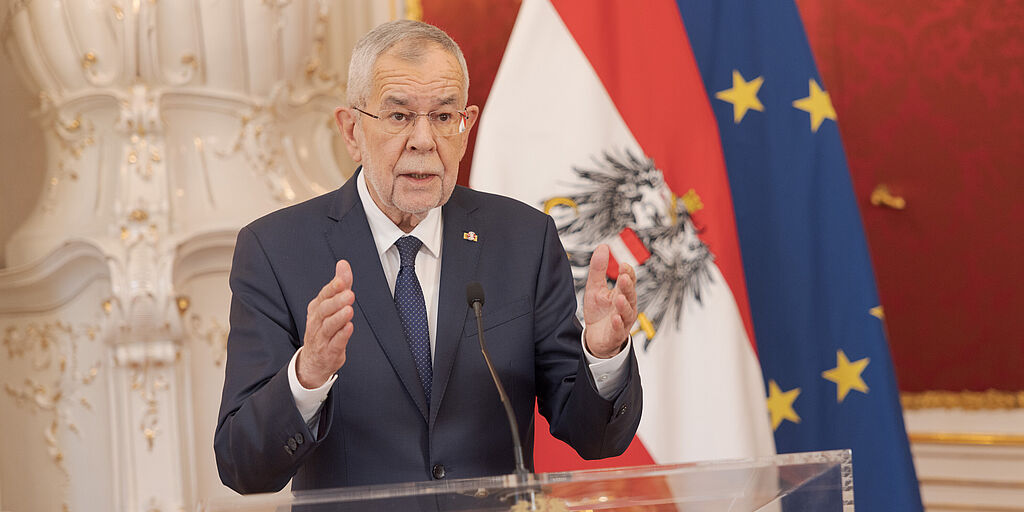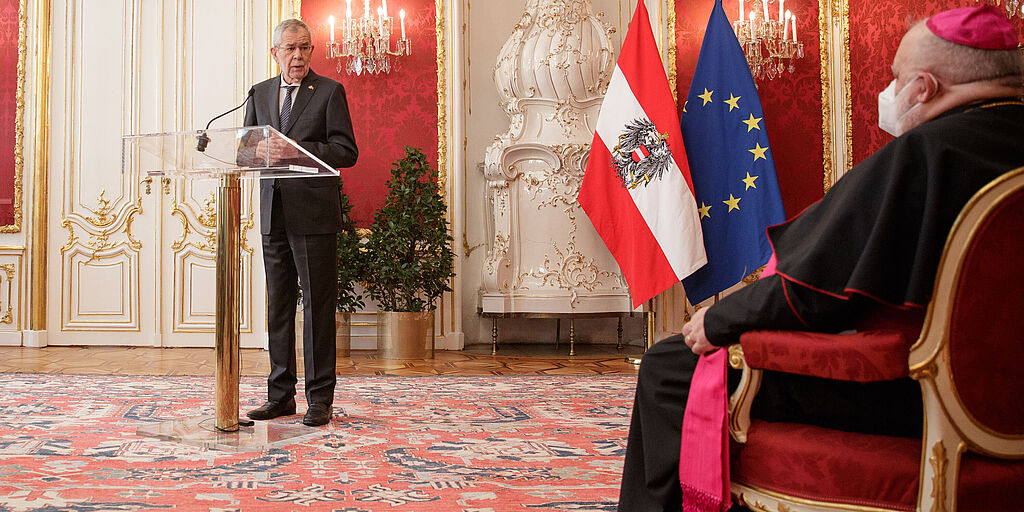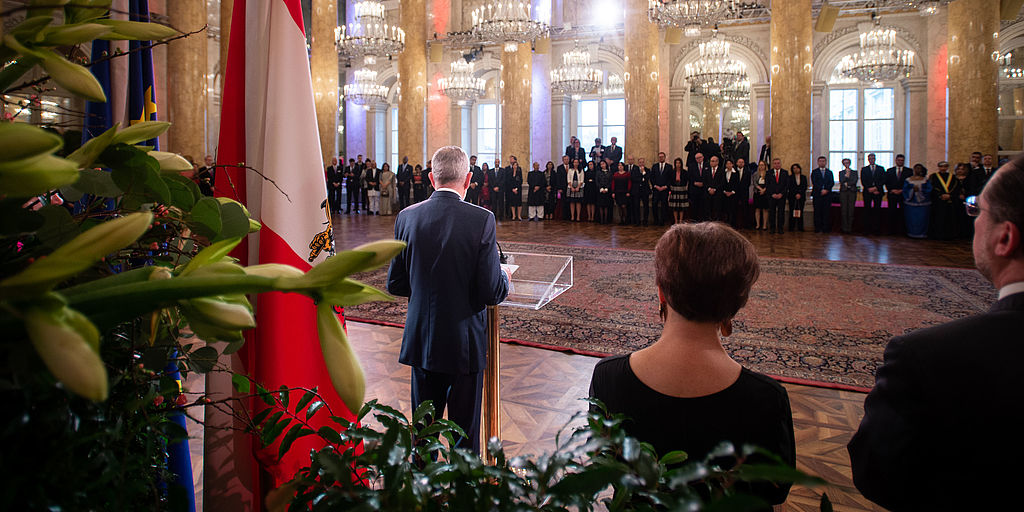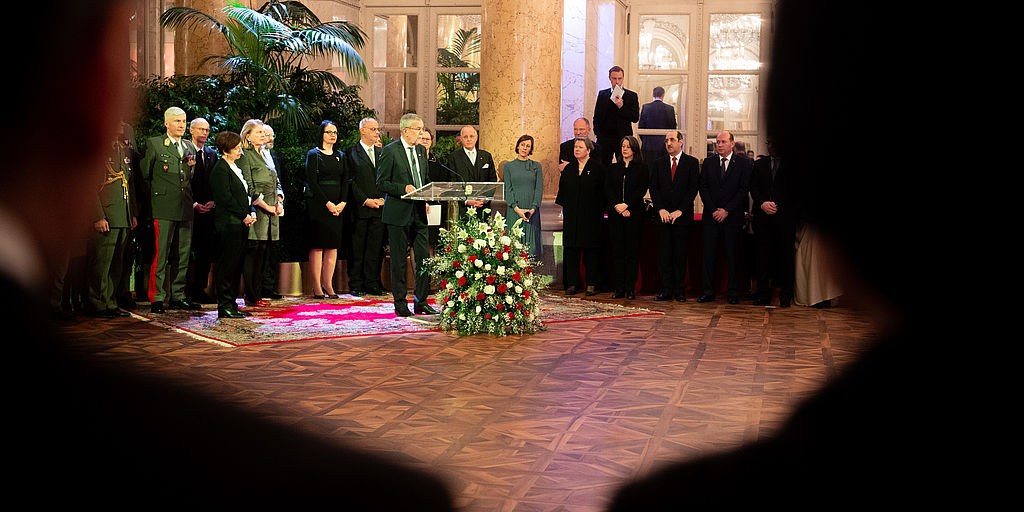Adress by Austrian Federal President Alexander Van der Bellen on the Occasion of the New Year’s Reception for the Diplomatic Corps.
Rede des Bundespräsidenten Alexander Van der Bellen auf deutsch DOWNLOAD
Adress by Federal President Alexander Van der Bellen in English DOWNLOAD
Allocution du Président fédéral Alexander Van der Bellen en français DOWNLOAD
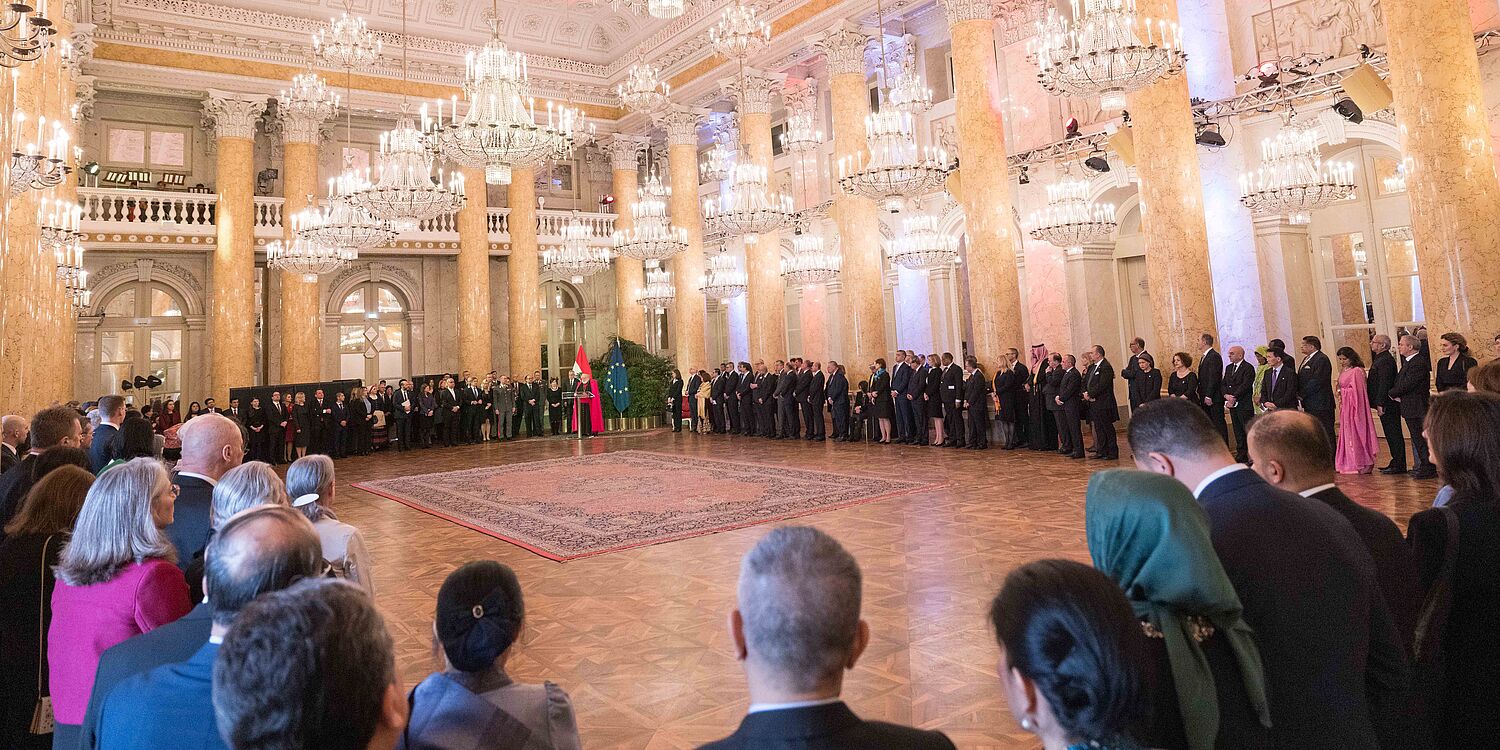
Neujahrsempfang für das Diplomatische Corps im Zeremoniensaal der Wiener Hofburg. Foto: Peter Lechner/HBF
Most Reverend Apostolic Nuncio,
Esteemed Federal Minister Schallenberg,
Excellencies,
Ladies and Gentlemen,
I thank you, Most Reverend Apostolic Nuncio, for your cordial wishes for the New Year and my second term of office, expressed on behalf of the Diplomatic Corps.
Three years after the beginning of the pandemic, it is a great pleasure for me to finally welcome you all again personally at the Hofburg[1] to express my gratitude and my best wishes for the New Year. As this is our first meeting in my second term of office, I take this opportunity to thank you for the excellent cooperation during the past six years. You have all made important contributions to maintaining and deepening our good bilateral relations, and many of you are involved in this effort on a daily basis within the framework of the international organizations headquartered in Vienna. I am looking forward to continuing our cooperation in the years to come.
Before I start with my speech, I would like to say a few words about the tragic earthquake that struck Türkiye and Syria last week.
I would like express my deepest condolences to the tens of thousands of victims, those who lost their beloved ones, their families, friends and homes.
Austria deployed 82 soldiers, who are part of the Austrian Forces Disaster Relief Unit (AFDRU), to Türkiye, and Austrian NGOs are providing support in the affected areas. We will continue to do our utmost to provide humanitarian support and alleviate the suffering of the victims and the affected communities. It is essential to ensure humanitarian access to all of those affected, irrespective of where they live.
I think we all agree that 2022 was not an easy year. It is true that we succeeded in getting the pandemic under control, thanks to excellent international cooperation, but almost exactly a year ago, President Putin launched a terrible war of aggression against Ukraine.
I was deeply moved by what I witnessed during my visit to Ukraine two weeks ago. The suffering, the destruction, the injustice, the cruelty of war. Day after day, Ukrainian men and women are fighting for their freedom, with incredible determination and at unimaginable cost.
For Austria, this war means a significant upheaval. This may not be visible at first glance: We have so many connections both to Ukraine and to Russia, our countries are strongly interconnected in economic terms. As regards our energy supply, we also have strong links to Ukraine and, above all, Russia. I will come back to this issue in greater detail later. And we are a neutral country.
Ladies and Gentlemen,
let me make one thing absolutely clear: Austria is neutral in military terms, but we are not neutral in political terms.
Neutrality does not mean indifference!
We are not neutral in the face of a blatant violation of international law.
We are not neutral in the face of war crimes.
We are not neutral towards the struggle of a country fighting to defend its sovereignty and its independence, fighting for its freedom.
Austria condemns the Russian war of aggression against Ukraine in the strongest possible terms.
Since the beginning of the war, Austria has provided humanitarian and financial support for Ukraine in the amount of about 120 million euro. Approximately 90,000 displaced persons, mostly women and children, have found refuge in Austria from the horrors of the war. It is our shared task to defend the principles to which we committed ourselves in the Charter of the United Nations: the sovereign equality of all states, the maintenance of international peace, compliance with international law, the protection of human rights, and the promotion of international cooperation.
The consequences of this brutal war of aggression go far beyond Ukraine and Europe. The sudden scarcity of food and energy resources has triggered high inflation rates all over the world. Uninvolved civilians all around the world are thus being held hostage. We are confronted with these shortages in an ailing post-COVID-19 world economy. Again, we need to show solidarity and support those countries that have been hit hardest.
We have learned how dangerous dependencies can become. We now have to work hard to reduce such dependencies and diversify our sources of supply.
In Austria, this applies, above all, to the energy sector. Over the past year, we have succeeded in reducing our dependence on Russian gas. We must continue doing everything we can to transition away from coal, oil and natural gas as quickly as possible. This is essential for climate protection and for our independence. The transition will not happen overnight, but we must work hard on it every day. Our focus must be entirely clear: We must expand clean and affordable renewable sources of energy!
The fight against the climate emergency has always been and will remain one of my political priorities. It is the greatest global challenge we are facing, and we can only address it together, as an international community.
Only if we join forces will we be able to turn the tide.
2022 was marked by wildfires, droughts, disastrous floods and other extreme weather events. Climate change is progressing even faster than predicted by scientists. I have the impression that many people don’t realize that our very existence is at stake.
UN Secretary General Antonió Guterres put it so rightly when he said: “It is either a Climate Solidarity Pact – or a Collective Suicide Pact.”
In meiner heutigen Rede vor dem Diplomatischen Corps habe ich in aller Deutlichkeit gesagt: #Österreich ist zwar militärisch neutral, aber wir sind keineswegs neutral in unserer Haltung. #Neutralität ist nicht Gleichgültigkeit!
— A. Van der Bellen (@vanderbellen) February 14, 2023
(1/3) pic.twitter.com/Hbx5FPzzhr
However, the outcome of the COP27 last November, which I attended after my re-election, was sobering. Member States failed to agree on more ambitious targets for the reduction of emissions. One ray of hope was the agreement to set up a Loss and Damage Fund. An important step towards climate justice, but far from enough. We need to do much more, much faster.
I fully understand that young people are angry and frustrated. Their future is at stake. We must do more, and do it at a much faster pace! During my second term of office I will certainly try to do my part.
Alongside the fight against the climate emergency, I would like to mention three other priorities which I will focus on in the coming year and, most probably, throughout my entire second term of office: multilateral cooperation, cohesion in Europe, and the protection of human rights.
Without doubt, we live in an interconnected world. It is therefore all the more important that all countries adhere to the agreed principles. A well-functioning, value- and rules-based international order is absolutely essential for the security and future of every country. As a neutral country, host country to the UN, the OSCE, the Fundamental Rights Agency of the EU and numerous other important international organizations, Austria is a tireless advocate of multilateralism.
Austria stands ready to assume additional responsibility for the international community. About ten years ago, we announced our candidacy as a non-permanent member of the UN Security Council for the period 2027/2028. We hope that we can count on your support!
Russia’s war of aggression against Ukraine has shown, once again, that European unification is the best idea we have ever had a point which I have made many times before.
As European Union, we have succeeded in positioning ourselves geopolitically, in responding to this war with one voice, and in addressing the resulting challenges together.
We have proven to be a political and economic community, a community of values. We have proven that we can act consistently and with determination, together with our partners, taking a firm stance for sovereignty, freedom and democracy.
Our Eastern neighbours and our partners in the Western Balkans are part of the European family.
As you know, Austria has for years been an advocate for the European integration of the Western Balkan countries. The decision taken by the European Council in December to grant EU candidate status to Bosnia-Herzegovina, the agreement on visa liberalization for Kosovo as of 2024 and finally! the beginning of accession negotiations with North Macedonia and Albania, two countries I will visit at the end of March, are positive developments and important signals sent to the entire region.
The wish expressed by Ukraine, Moldova and Georgia to join the European Union is encouraging, and we will support these countries on their way towards a European future in the best possible way.
Excellencies,
Ladies and Gentlemen,
during the past year, we have witnessed particularly severe violations of human rights. In Iran, the regime has for months been using excessive and lethal violence against people who are standing up for women’s rights, human rights, freedom and democracy. Since the Taliban came to power in Afghanistan, countless Afghan women and men have been exposed to the most severe reprisals. Minorities are being persecuted, peaceful protests have been put down with violence, and women are being relentlessly oppressed in all spheres of life.
In this special year of 2023, in which we celebrate the 75th anniversary of the Universal Declaration of Human Rights, we must not turn a blind eye to what is happening. We must stand shoulder to shoulder with people all over the world who are fighting for their rights, their freedom, their human dignity. The development of human rights is far from complete.
This year, we also celebrate the 30th anniversary of the World Conference on Human Rights in Vienna, which contributed decisively to the creation of the Office of the High Commissioner for Human Rights, a position that has been held by Volker Türk, a fellow Austrian, since last year. To mark the occasion, Austria will host a high-level conference of experts in June of this year.
The challenges we face as an international community have not diminished over the past year. On the contrary, they have multiplied and increased in complexity.
As ambassadors of your countries, as mediators, you are contributing to maintaining a dialogue, fostering mutual understanding, and strengthening international cooperation.
You, Excellencies, Ladies and Gentlemen, play an important role in shaping our common future.
I therefore appeal to you to keep up your commitment and to draw strength from what we have achieved so far, inspired by the vision of a future our younger generations can look forward to.
I wish you and your families all the best for the coming year!
[1] The last New Year’s Reception took place in 2020; in 2021 and 2022, the Federal President delivered his speeches virtually.
